一般疑问句、特殊疑问句、选择疑问句
- 格式:pdf
- 大小:372.34 KB
- 文档页数:6
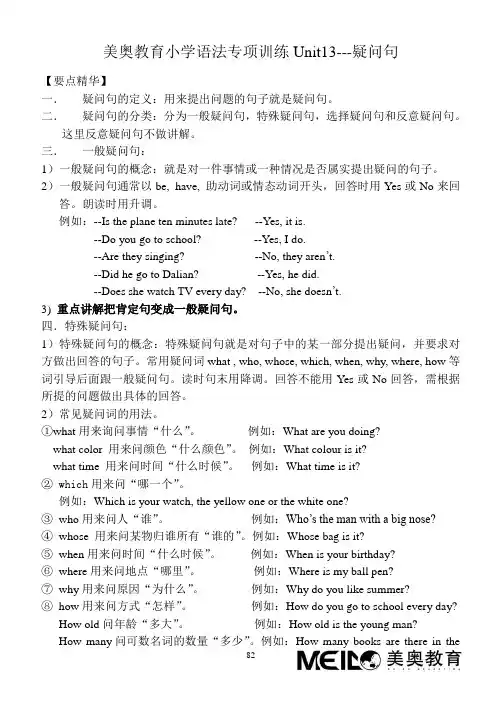
【要点精华】一.疑问句的定义:用来提出问题的句子就是疑问句。
二.疑问句的分类:分为一般疑问句,特殊疑问句,选择疑问句和反意疑问句。
这里反意疑问句不做讲解。
三.一般疑问句:1)一般疑问句的概念:就是对一件事情或一种情况是否属实提出疑问的句子。
2)一般疑问句通常以be, have, 助动词或情态动词开头,回答时用Yes或No来回答。
朗读时用升调。
例如:--Is the plane ten minutes late? --Yes, it is.--Do you go to school? --Yes, I do.--Are they singing? --No, they aren’t.--Did he go to Dalian? --Yes, he did.--Does she watch TV every day? --No, she doesn’t.3) 重点讲解把肯定句变成一般疑问句。
四.特殊疑问句:1)特殊疑问句的概念:特殊疑问句就是对句子中的某一部分提出疑问,并要求对方做出回答的句子。
常用疑问词what , who, whose, which, when, why, where, how等词引导后面跟一般疑问句。
读时句末用降调。
回答不能用Yes或No回答,需根据所提的问题做出具体的回答。
2)常见疑问词的用法。
①what用来询问事情“什么”。
例如:What are you doing?what color 用来问颜色“什么颜色”。
例如:What colour is it?what time 用来问时间“什么时候”。
例如:What time is it?② which用来问“哪一个”。
例如:Which is your watch, the yellow one or the white one?③who用来问人“谁”。
例如:Who’s the man with a big nose?④whose 用来问某物归谁所有“谁的”。
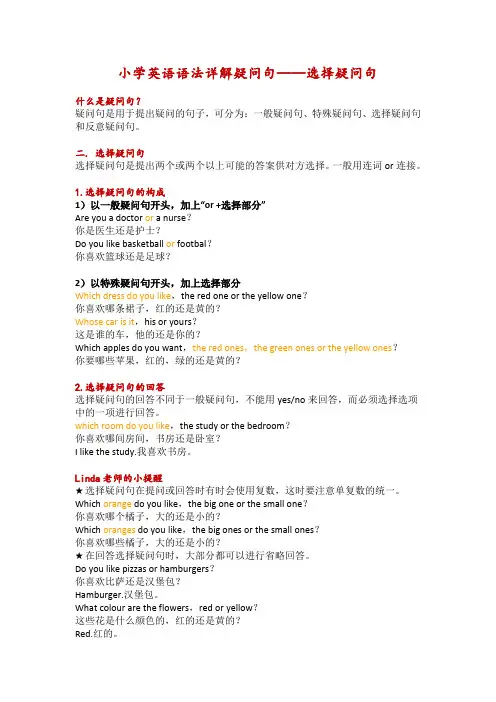
什么是疑问句?疑问句是用于提出疑问的句子,可分为:一般疑问句、特殊疑问句、选择疑问句和反意疑问句。
二. 选择疑问句选择疑问句是提出两个或两个以上可能的答案供对方选择。
一般用连词or连接。
1.选择疑问句的构成1)以一般疑问句开头,加上“or +选择部分”Are you a doctor or a nurse?你是医生还是护士?Do you like basketball or footbal?你喜欢篮球还是足球?2)以特殊疑问句开头,加上选择部分Which dress do you like,the red one or the yellow one?你喜欢哪条裙子,红的还是黄的?Whose car is it,his or yours?这是谁的车,他的还是你的?Which apples do you want,the red ones,the green ones or the yellow ones?你要哪些苹果,红的,绿的还是黄的?2.选择疑问句的回答选择疑问句的回答不同于一般疑问句,不能用yes/no来回答,而必须选择选项中的一项进行回答。
which room do you like,the study or the bedroom?你喜欢哪间房间,书房还是卧室?I like the study.我喜欢书房。
Linda老师的小提醒★选择疑问句在提问或回答时有时会使用复数,这时要注意单复数的统一。
Which orange do you like,the big one or the small one?你喜欢哪个橘子,大的还是小的?Which oranges do you like,the big ones or the small ones?你喜欢哪些橘子,大的还是小的?★在回答选择疑问句时,大部分都可以进行省略回答。
Do you like pizzas or hamburgers?你喜欢比萨还是汉堡包?Hamburger.汉堡包。
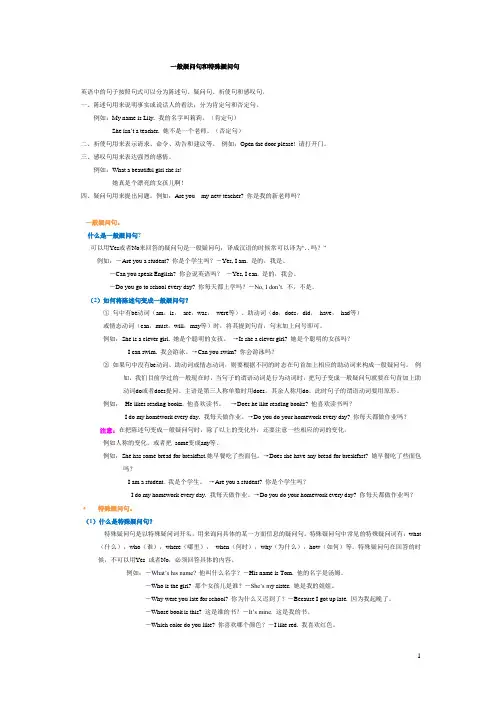
一般疑问句和特殊疑问句英语中的句子按照句式可以分为陈述句、疑问句、祈使句和感叹句。
一、陈述句用来说明事实或说话人的看法;分为肯定句和否定句。
例如:My name is Lily. 我的名字叫莉莉。
(肯定句)She isn’t a teacher. 她不是一个老师。
(否定句)二、祈使句用来表示请求、命令、劝告和建议等。
例如:Open the door please! 请打开门。
三、感叹句用来表达强烈的感情。
例如:What a beautiful girl she is!她真是个漂亮的女孩儿啊!四、疑问句用来提出问题。
例如:Are you my new teacher? 你是我的新老师吗?一般疑问句。
什么是一般疑问句?可以用Yes或者No来回答的疑问句是一般疑问句;译成汉语的时候常可以译为“..吗?”例如:-Are you a student? 你是个学生吗?-Yes, I am. 是的,我是。
-Can you speak English? 你会说英语吗?-Yes, I can. 是的,我会。
-Do you go to school every day? 你每天都上学吗?-No, I don’t. 不,不是。
(2)如何将陈述句变成一般疑问句?①句中有be动词(am,is,are,was,were等)、助动词(do,does,did,have,had等)或情态动词(can,must,will,may等)时,将其提到句首,句末加上问号即可。
例如:She is a clever girl. 她是个聪明的女孩。
→Is she a clever girl? 她是个聪明的女孩吗?I can swim. 我会游泳。
→Can you swim? 你会游泳吗?②如果句中没有be动词、助动词或情态动词,则要根据不同的时态在句首加上相应的助动词来构成一般疑问句。
例如,我们目前学过的一般现在时,当句子的谓语动词是行为动词时,把句子变成一般疑问句就要在句首加上助动词do或者does提问。
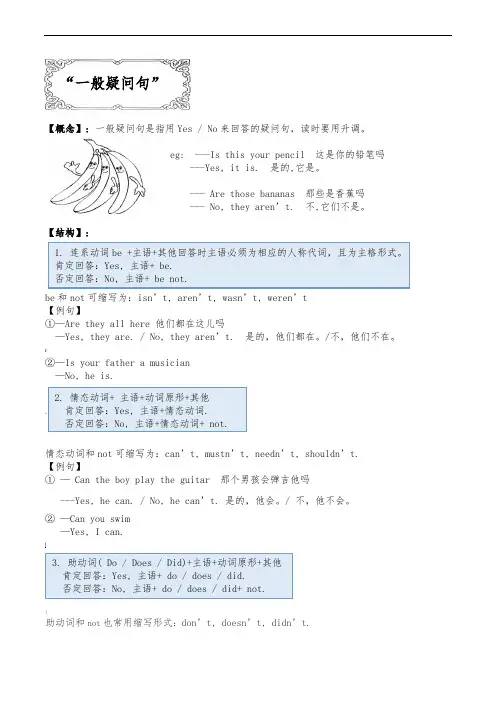
“一般疑问句”【概念】: 一般疑问句是指用Yes / No来回答的疑问句,读时要用升调。
eg: ---Is this your pencil 这是你的铅笔吗---Yes, it is. 是的,它是。
:--- Are those bananas 那些是香蕉吗--- No, they aren’t. 不,它们不是。
【结构】:1. 连系动词be +主语+其他回答时主语必须为相应的人称代词,且为主格形式。
肯定回答:Yes, 主语+ be.否定回答:No, 主语+ be not.be和not可缩写为:isn’t, aren’t, wasn’t, weren’t【例句】①—Are they all here 他们都在这儿吗—Yes, they are. / No, they aren’t. 是的,他们都在。
/不,他们不在。
)②—Is your father a musician—No, he is.2. 情态动词+ 主语+动词原形+其他肯定回答:Yes, 主语+情态动词.否定回答:No, 主语+情态动词+ not.情态动词和not可缩写为:can’t, mustn’t, needn’t, shouldn’t.【例句】①— Can the boy play the guitar 那个男孩会弹吉他吗---Yes, he can. / No, he can’t. 是的,他会。
/ 不,他不会。
②—Can you swim—Yes, I can.[3. 助动词( Do / Does / Did)+主语+动词原形+其他肯定回答:Yes, 主语+ do / does / did.否定回答:No, 主语+ do / does / did+ not.(助动词和not也常用缩写形式:don’t, doesn’t, didn’t.【例句】①—Do you want to go to the movie 你想去看电影吗—Yes, I do. / No, I don’t. 是的,我想去。
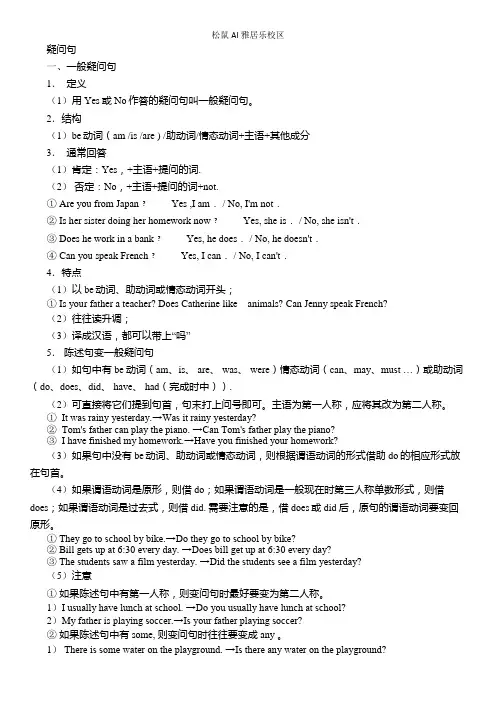
疑问句一、一般疑问句1.定义(1)用Yes或No作答的疑问句叫一般疑问句。
2.结构(1)be动词(am /is /are ) /助动词/情态动词+主语+其他成分3.通常回答(1)肯定:Yes,+主语+提问的词.(2)否定:No,+主语+提问的词+not.① Are you from Japan﹖Yes ,I am. / No, I'm not.② Is her sister doing her homework now﹖Yes, she is. / No, she isn't.③ Does he work in a bank﹖Yes, he does. / No, he doesn't.④ Can you speak French﹖Yes, I can. / No, I can't.4.特点(1)以be动词、助动词或情态动词开头;① Is your father a teacher? Does Catherine like animals? Can Jenny speak French?(2)往往读升调;(3)译成汉语,都可以带上“吗”5.陈述句变一般疑问句(1)如句中有be 动词(am、is、 are、 was、 were)情态动词(can、may、must …)或助动词(do、does、did、 have、 had(完成时中)).(2)可直接将它们提到句首,句末打上问号即可。
主语为第一人称,应将其改为第二人称。
①It was rainy yesterday.→Was it rainy yesterday?②Tom's father can play the piano. →Can Tom's father play the piano?③ I have finished my homework.→Have you finished your homework?(3)如果句中没有be动词、助动词或情态动词,则根据谓语动词的形式借助do的相应形式放在句首。
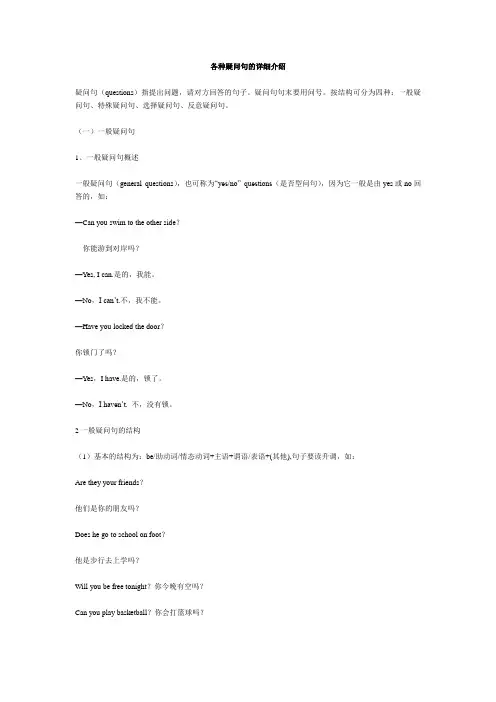
各种疑问句的详细介绍疑问句(questions)指提出问题,请对方回答的句子。
疑问句句末要用问号。
按结构可分为四种:一般疑问句、特殊疑问句、选择疑问句、反意疑问句。
(一)一般疑问句1、一般疑问句概述一般疑问句(general questions),也可称为“yes/no” questions(是否型问句),因为它一般是由yes或no回答的,如:—Can you swim to the other side?你能游到对岸吗?—Yes, I can.是的,我能。
—No,I can’t.不,我不能。
—Have you locked the door?你锁门了吗?—Yes,I have.是的,锁了。
—No,I haven’t. 不,没有锁。
2一般疑问句的结构(1)基本的结构为:be/助动词/情态动词+主语+谓语/表语+(其他),句子要读升调,如:Are they your friends?他们是你的朋友吗?Does he go to school on foot?他是步行去上学吗?Will you be free tonight?你今晚有空吗?Can you play basketball?你会打篮球吗?(2)陈述句亦可用作一般疑问句,多用在非正式文体中,句末有问号,用升调,如:Somebody is with you?有人和你一起吗?He didn’t finish the work?他没有做完活吗?You are fresh from America,I suppose?我猜,你刚从美国回来吧?3、一般疑问句的答语(1)一般疑问句一般由yes或no来回答,如:—Are you tired?你累了吗?—Yes,I am.是的,累了。
—No, I’m not.不,不累。
—Does she do the cleaning?她扫除了吗?—Yes ,she does.是的,她打扫了。
—No,she doesn’t.不,她没打扫。
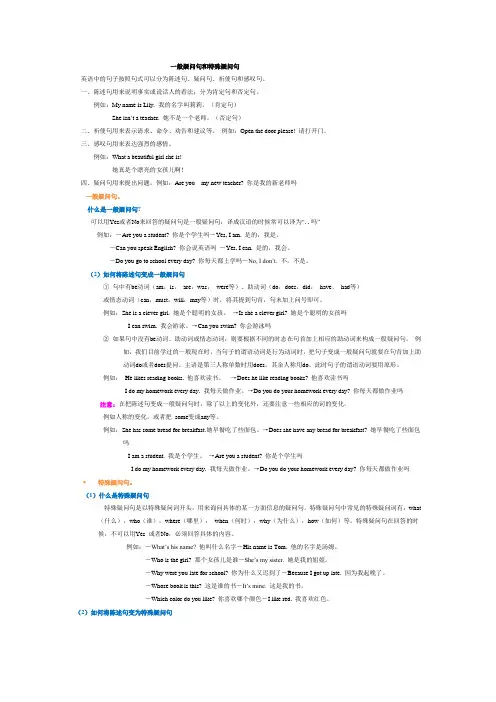
一般疑问句和特殊疑问句英语中的句子按照句式可以分为陈述句、疑问句、祈使句和感叹句。
一、陈述句用来说明事实或说话人的看法;分为肯定句和否定句。
例如:My name is Lily. 我的名字叫莉莉。
(肯定句)She isn’t a teacher. 她不是一个老师。
(否定句)二、祈使句用来表示请求、命令、劝告和建议等。
例如:Open the door please! 请打开门。
三、感叹句用来表达强烈的感情。
例如:What a beautiful girl she is!她真是个漂亮的女孩儿啊!四、疑问句用来提出问题。
例如:Are you my new teacher? 你是我的新老师吗一般疑问句。
什么是一般疑问句?可以用Yes或者No来回答的疑问句是一般疑问句;译成汉语的时候常可以译为“..吗”例如:-Are you a student? 你是个学生吗-Yes, I am. 是的,我是。
-Can you speak English? 你会说英语吗-Yes, I can. 是的,我会。
-Do you go to school every day? 你每天都上学吗-No, I don’t. 不,不是。
(2)如何将陈述句变成一般疑问句①句中有be动词(am,is,are,was,were等)、助动词(do,does,did,have,had等)或情态动词(can,must,will,may等)时,将其提到句首,句末加上问号即可。
例如:She is a clever girl. 她是个聪明的女孩。
→Is she a clever girl? 她是个聪明的女孩吗I can swim. 我会游泳。
→Can you swim? 你会游泳吗②如果句中没有be动词、助动词或情态动词,则要根据不同的时态在句首加上相应的助动词来构成一般疑问句。
例如,我们目前学过的一般现在时,当句子的谓语动词是行为动词时,把句子变成一般疑问句就要在句首加上助动词do或者does提问。
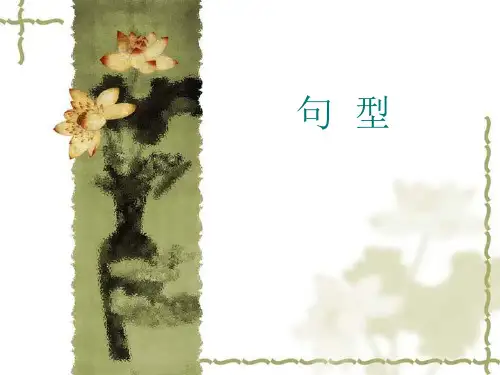
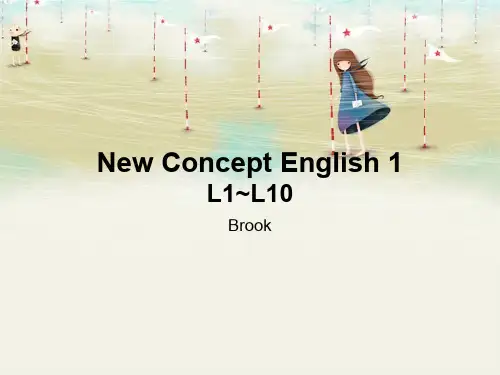


一般疑问句、(一)一般疑问句1、一般疑问句概述一般疑问句(general questions),也可称为“yes/no”questions(是否型问句),因为它一般是由yes或no回答的,如:—Can you swim to the other side 你能游到对岸吗—Yes, I can.是的,我能。
—No,I can’t.不,我不能。
—Have you locked the door 你锁门了吗—Yes,I have.是的,锁了。
—No,I haven’t. 不,没有锁。
2一般疑问句的结构(1)基本的结构为:be/助动词/情态动词+主语+谓语/表语+(其他),句子要读升调,如:Are they your friends 他们是你的朋友吗Does he go to school on foot 他是步行去上学吗Will you be free tonight你今晚有空吗Can you play basketball你会打篮球吗(2)陈述句亦可用作一般疑问句,多用在非正式文体中,句末有问号,用升调,如:Somebody is with you 有人和你一起吗He didn’t finish the work 他没有做完活吗You are fresh from America,I suppose 我猜,你刚从美国回来吧3、一般疑问句的答语(1)一般疑问句一般由yes或no来回答,如:—Are you tired你累了吗—Yes,I am.是的,累了。
—No, I’m not.不,不累。
—Does she do the cleaning她扫除了吗—Yes ,she does.是的,她打扫了。
—No,she doesn’t.不,她没打扫。
(2)回答一般疑问句除了用yes或no外,也可用certainly,probably,perhaps,of course,all right,with pleasure等代替yes,用never,not at all等代替no,如:—Can you help me你能帮个忙吗—Certainly.当然。
(一)一般疑问句1、一般疑问句概述一般疑问句(general questions),也可称为“yes/no” questions(是否型问句),因为它一般是由yes或no回答的,如:—Can you swim to the other side?你能游到对岸吗?—Yes, I can.是的,我能。
—No,I can’t.不,我不能。
—Have you locked the door?你锁门了吗?—Yes,I have.是的,锁了。
—No,I haven’t. 不,没有锁。
2一般疑问句的结构(1)基本的结构为:be/助动词/情态动词+主语+谓语/表语+(其他),句子要读升调,如:Are they your friends?他们是你的朋友吗?Does he go to school on foot?他是步行去上学吗?Will you be free tonight?你今晚有空吗?Can you play basketball?你会打篮球吗?(2)陈述句亦可用作一般疑问句,多用在非正式文体中,句末有问号,用升调,如:Somebody is with you?有人和你一起吗?He didn’t finish the work?他没有做完活吗?You are fresh from America,I suppose?我猜,你刚从美国回来吧?3、一般疑问句的答语(1)一般疑问句一般由yes或no来回答,如:—Are you tired?你累了吗?—Yes,I am.是的,累了。
—No, I’m not.不,不累。
—Does she do the cleaning?她扫除了吗?—Yes ,she does.是的,她打扫了。
—No,she doesn’t.不,她没打扫。
(2)回答一般疑问句除了用yes或no外,也可用certainly,probably,perhaps,of course,all right,with pleasure等代替yes,用never,not at all等代替no,如:—Can you help me?你能帮个忙吗?—Certainly.当然。
疑问句大全疑问句(questions)指提出问题,请对方回答的句子。
疑问句句末要用问号。
按结构可分为四种:一般疑问句、特殊疑问句、选择疑问句、反意疑问句。
(一)一般疑问句(一)一般疑问句1、一般疑问句概述 一般疑问句(general questions),也可称为“yes/no” questions(是否型问句),因为它一般是由yes或no回答的,如: —Can you swim to the other side 你能游到对岸吗?你能游到对岸吗? —Yes, I can.是的,我能。
是的,我能。
—No,I c an’t.不,我不能。
—Have you locked the door? 你锁门了吗? —Y es,I have.是的,锁了。
是的,锁了。
—No,I haven’t. 不,没有锁。
2一般疑问句的结构 (1)基本的结构为:be/助动词/情态动词+主语+谓语/表语+(其他),句子要读升调,如: Are they your friends? 他们是你的朋友吗? Does he go to school on foot? 他是步行去上学吗? Will you be free tonight?你今晚有空吗? Can you play basketball?你会打篮球吗? (2)陈述句亦可用作一般疑问句,多用在非正式文体中,句末有问号,用升调,如: Somebody is with you? 有人和你一起吗? He didn’t finish the work? 他没有做完活吗? You are fresh from America,I suppose? 我猜,你刚从美国回来吧? 3、一般疑问句的答语 (1)一般疑问句一般由yes或no来回答,如: —Are you tired你累了吗??你累了吗? —Y es,I am.是的是的,累了。
—No, I’m not.不,不累。
—Does she do the cleaning?她扫除了吗? —Y es ,she does.是的,她打扫了。
一般疑问句及特殊疑问句疑问句分为一般疑问句(General Question)和特殊疑问句(Special Question)Part One 一般疑问句1. 一般疑问句:用be或助动词或情态动词置于句首,并以“Yes,…”,或“No,…”或相当于yes / no回答的问句称为一般疑问句.2. 含系动词be的一般疑问句的构成:1)具体地说,am 只能跟在第一人称的单数I 后面;are 搭配you, 不管是单数还是复数;is 跟在第三人称单数he, she 后面。
如:I'm in Class 2, Grade 1.→Are you in Class 2, Grade 1? 你是在一年级二班吗?(如遇第一人称,最好将其置换成第二人称)2)be 或have(有)置于句首来表达疑问,eg:Am I wrong again? (我又错了?)Yes, you are (wrong again). (是的,你又错了。
)No, you aren’t. (不,你没错。
)eg:Is it your bicycle? (这辆自行车是你的吗?)Yes, it is. (是的,是我的。
)No, it isn’t. (不,那不是我的。
)3. 含情态动词的一般疑问句的构成:情态动词提至主语前。
eg:-I can spell it. →Can you spell it? 你会拼写它吗?-Shall I call a taxi for you ? (需要我替你叫一辆出租车吗?)-Yes, please. Thank you. (好的,谢谢你。
)-No, thank you.(不必了,谢谢你。
)-Will you do that for her? (你愿意替她做那件事吗?)-Yes, I will.(是的,我愿意。
)-No, I won’t.(不,我不愿意。
)-Can she drive? (她会开车吗?)-Yes, she can.(是的,她会。
英语中的疑问句疑问句主要用来提问。
根据其语法结构和交际功能,可以分为以下四种类型:一般疑问句、特殊疑问句、选择疑问句和歧义疑问句。
Are you a fireman? 你是一名消防员吗?(一般疑问句)What do you do at the weekend? 你周末干什么? (特殊疑问句)Would you like to have rice or noodles? 你喜欢吃米饭还是面条? (选择疑问句)He is a Chinese teacher, isn't he? 他是一名汉语老师,不是吗?(反意疑问句)一、一般疑问句(yes-no question)一般疑问句通常用来询问一件事情或一种情况是否属实,其回答通常是 yes 或 no,因此这类问句又叫做“是非问句”1、肯定提问Is there something wrong with this machine? 这台机器有问题吗Have you got today's milk? 你拿到今天的牛奶了吗Shall we go on? 我们继续向前吗Must I finish my work on time? 我必须按时完成我的工作吗Can you speak French? 你会说法语吗Would you like me to interpret for you? 要不要我帮你翻译Do you have a smaller size? 你有小一点的尺寸吗Does Susan speak English? 苏珊讲英语吗Did you mom go shopping last weekend? 你妈妈上个周末去买东西了吗2、否定提问Will he not agree with you? 他不同意你吗Haven't you any sisters? 你没有姐妹吗Don't you like this movie? 你不喜欢这部电影吗Can't we go together? 我们不能一起去吗Won't you sit down? 你不想坐下吗Hasn't she been up to the mark lately? 最近她一直感到不太舒服吗3、回答Will you agree with us to e here? 你同意我们来这里吗Yes, we will. 是的,我们会 | No, we won't. 不,我们不会Have got today's newspaper? 你有今天的报纸吗Yes, I have. 是的,有 | No, I haven't. 不,没有Can't he afford a new house? 他买不起新房吗Yes, he can. 不,他能 | No, he can't. 是的,他不能二、特殊疑问句(special question)特殊疑问句是对句中的某一部分提出疑问,通常以 who、where、when、why等疑问词开头,因此又叫“wh-问句”1、疑问代词疑问代词:who、whom、whose、which、whatWho are you? 你是谁Whom are you going to play table tennis this afternoon? 今天下午你和谁打乒乓球Whose glasses are broken? 谁的眼镜打碎了Which shoes do you like? 你喜欢哪双鞋子What do they want to do? 他们想要做什么2、疑问副词疑问副词:when、where、why、howWhen does she want to practice? 她想要什么时候练习Where is the restroom? 洗手间在哪里Why did you leave? 你为什么离开了How do you study English? 你怎么学习英语3、how 构成的短语how 构成的短语:how about = what about 怎么样、how many times 多少次、how do you say... 你怎么说、how are you 普通问好、how many/much 多少、how old 多大年纪、how far 多远、how often 多久一次、 how long 多久、how soon 多久以后等How about bringing some ice cream? 带一些冰激凌怎么样How do you say this word in English? 你怎么用英语说这个单词Howare you? how are you 只是普通问好的方式。
网络课程内部讲义初中英语句法全攻略:疑问句1教师:金春花温馨提示:本讲义为A4大小,如需打印请注意用纸尺寸爱护环境,从我做起,提倡使用电子讲义一、疑问句的类型:1.Is it a pen? 一般疑问句Do you like pandas?2.What is it? 特殊疑问句What are you going to do?3.Is it a pen or a book? 选择疑问句What would you like, pears or apples?4.It is very useful, isn’t it? 反义疑问句They will go to the Great Wall tomorrow, won’t they?二、一般疑问句:general questions也可称为“yes/no”questions(是否型问句)1.询问事物或某种情况是否属实,翻译成汉语:”……吗?”回答:yes;no2.将陈述句改为一般疑问句A.陈述句中含有be动词、情态动词或助动词:直接将be动词、情态动词或助动词提前。
e.g.1 He is an honest boy. Is he an honest boy?结构:be动词+主语+其他?(be动词:is、am、are/was、were)e.g.2 Can he be an honest boy?结构:情态动词+主语+其他?B.陈述句中不含有be动词、情态动词或助动词:将相应的助动词提前。
e.g.3 He likes sports. Does he like sports?结构:助动词+主语+V原形+其他?(助动词:do、does、did)3.一般疑问句的回答三步走:1. 回答yes/no 2. 问谁答谁:代词(主格)3. 用什么问,用什么答:否定必须缩写e.g.1 Do they like sports? Yes, they do. No, they don’t.e.g.2 Do you like sports? Yes, I do. No, I don’t.e.g.3 Does Tom like sports? Yes, he does. No, he doesn’t.e.g.4 Does this bag belong to him? Yes, it does. No, it doesn’t.e.g.5 Will his parents like sports? Yes, they will. No, they willn’t.练习:将下列句子改为一般疑问句, 并做肯定以及否定回答。
1.I want to have a cup of coffee.2.There are some cars on the street.3.The girl under the tree is playing with her sister.4.These beautiful flowers belong to her.5.He has been in America for about 5 years.三、特殊疑问句(special questions)也可称为“wh”-questions1.以特殊疑问词开头,对句中某一成分提问的句子叫特殊疑问句。
特殊疑问句不用yes或no回答。
2.特殊疑问词:A.疑问代词:who whom whose which whate.g.1 I went to shopping with my sister, and I bought the most expensive hat in the store.I:who(主格) my sister: whom(宾格)my: whose went to shopping: what the most expensive: whichB. 疑问副词:when where why howI went to Xidan yesterday by taxi, for I had something to buy.Xidan:where yesterday: when by taxi: how for I had something to buy: whyC. 疑问词短语:how many :可数名词复数 How many students are there in our class? how much :不可数名词 How much tea did you buy last night?提问价钱 How much is the tea which you bought yesterday? how often :多久一次(对频率提问) How ofter do you take exercise? 回答:once a month(一个月一次) twice a week(一周两次) three times a year(一年三次) many times a day(一天很多次)how far: 多远(询问距离) How far is it from your home to school? how long:多长(询问长度) How long is the Yellow River?多久(询问时间) How long will you stay in Shanghai? how soon:多快 —How soon will he come back? (一般将来时) —In two days.(两天以后)4. 特殊疑问句的格式:A.特殊疑问词+be+主语+其他?He is doing his homework. Q: What is he doing?B. 特殊疑问句+助动词+主语+V原+其他?He lives in Beijing. Q:Where does he live?★练习:A. 填入所缺的疑问词1._____do you like summer? Because I can swim.2.______is the post office? It’s next to the cinema.3._____can I get to Zhong Shan Park? By underground.4.______ _______ are you? I’m 14 years old5._____bag is on the desk?.Xiao Zhang’s.6. _____ book is Sarah’s? The yellow one.7. ______ will go with you? ChenJie. 8. _______is your skirt,Amy? It’s 100 yuan.B.单选1. ( )— Excuse me ______ is the nearest bookshop? —Go down the street and turn left .A. howB. whatC. whereD. who2. ( ) ______ is a ticker for the film Hacker He? About forty yuan .A. How oldB. How manyC. How muchD. How often3. ( )—________ are you going? — I’m going to the library.A. WhoB. WhichC. WhatD. Where4. ( ) —_______________? ----It’s eight.A. What day is itB. What’s five and threeC. How old are youD. What’s your telephone number5. ( ) —____________? —I’ve got a headache and a cough.A. What’s the matter with youB. What’s wrong with itC. Can I help youD. How are you6. ( )______ tea did you have? ----Two cups.A. How manyB. How muchC. How soonD. Which7. ( ) --______ a year does your school have sports meetings? --- Twice a year.A. How oftenB. How soonC. How longD. How many times8. ( )-- ______? -----The one behind the tree.A. Whose girlB. Who’s that girlC. Which girlD. Where’s the girl9. ( ) -______ are you going to be in the future? I want to be a person _____ Yang Liwei.A. How , likeB. How , asC. What , likeD. What , as10. ( ).______ will your father be back? .A How longB how oftenC How soonD How wideC. 就画线部分提问1.They meet each other once a month. ________ ________ ________ they meet each other?2.Tony went swimming last Thursday. ________ ________ Tony _______ swimming?3.My cousin looks like a sportsman. _______ _______ your cousin look like?4.The short play was wonderful. ________ did you ______ the short play?________ did you _______ ______ the short play?5.Our party lasted three hours. ________ _______ did your party last?6.I watched the variety show on TV. ________ did you watch on TV?7.It's Tuesday. ________ ________ is it today?8.The supermarket is about five minutes' walk. ________ ________ is the supermarket?9.They went to the park by bus. ________ ________ they go to the park?10.Bob surfed the Internet for forty minutes yesterday morning._______ _______ ________ Bob surf the Internet yesterday morning?四、选择疑问句(alternative questions)一般提出两种或两种以上的可能,问对方选择哪一种。